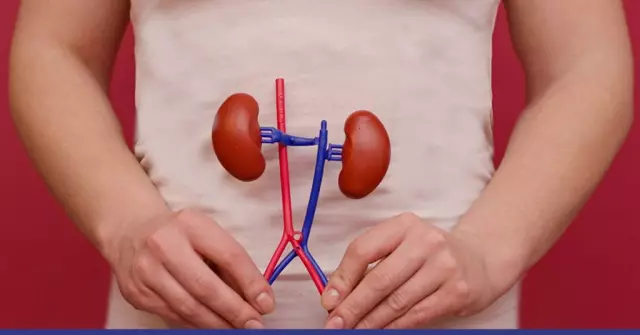- Author Rachel Wainwright wainwright@abchealthonline.com.
- Public 2023-12-15 07:39.
- Last modified 2025-11-02 20:14.
Anorexia

Anorexia is a disease characterized by a violation of normal eating behavior. Patients with anorexia show increased attention to their own weight and tend to almost completely limit themselves in food intake. At the same time, people with anorexia are so afraid to gain at least one extra kilogram that they bring themselves to almost complete exhaustion.
According to statistics, mainly young girls are susceptible to this disease, sometimes still adolescents, who are much more likely to succumb to outside influences and react painfully to criticism much more than other age categories. The disease begins with the fact that a girl who dreams of losing weight goes on a diet and is so addicted that even when her weight becomes 15-20% below normal, she still thinks that she is too fat.
For young girls, this disease is especially dangerous, since their body is still in the stage of growth and development. As a result, instead of a beautiful, healthy young woman, those around them see a certain disembodied ghost with bruises under the eyes and pale skin. In addition to external signs, anorexia contributes to the appearance of a number of diseases of the endocrine, nervous, cardiovascular systems, and the musculoskeletal system. This is due to the fact that at a time when the body especially needs a large amount of nutrients, patients with anorexia, on the contrary, starve themselves, which causes irreparable harm to the body.
The main reasons leading girls to anorexia are:
- unhealthy psychological atmosphere in the family;
- negative atmosphere around meals;
- distorted perception of one's own body and too low self-esteem;
- obsessive and obsessive behavior, perfectionism;
- fight against obstacles;
- an unmet need for love and acceptance.
Symptoms of anorexia
As a rule, patients with anorexia do not recognize such a problem, so the first symptoms of anorexia usually become noticeable to relatives and friends.
If relatives do not start sounding the alarm, the pursuit of the ideal weight can end very badly for the patient: sometimes not only the health, but also the girl's life is under threat.
The most important symptom of anorexia is a lot of weight loss, sometimes in a fairly short time. Unfortunately, this symptom becomes noticeable only when exhaustion approaches a critical point. Until that moment, it just seems to others that the girl decided to lose a couple of extra pounds.
Another symptom of anorexia to look out for is loss of appetite and a significant decrease in the size of the portion of food eaten at a time. With anorexia nervosa, girls often refuse to eat at all, finding many excuses for this (tired, recently had a snack, stomach hurts, etc.).
It should be noted that, despite the refusal to eat, people with anorexia are very fond of talking about food, especially about different diets and methods of burning calories. Many women with anorexia nervosa spend most of their free time in the kitchen preparing various meals. In this case, one has only to reach the absorption of these dishes, all appetite disappears somewhere.
As anorexia progresses, the patient's overall health deteriorates significantly. This is noted in the following clinical symptoms of anorexia:
- Increased fatigue. Anorexia patients experience general weakness and get tired quickly. This is due to the fact that the body has nowhere to take the necessary energy and it has to use internal reserves, which are far from unlimited. All this leads to increased drowsiness and frequent fainting.
- Deterioration of the condition of nails and hair. Hair loses shine and beauty, becomes dull and begins to split. Naturally, no hair remedy can help in this case. The body is deprived of essential minerals and vitamins, and this leads to the fact that nails and hair become dry and brittle.
- Change in the condition of the skin. The complexion becomes pale and deep shadows appear under the eyes. This is usually caused by iron deficiency anemia, which is invariably a complication of anorexia nervosa. Often, anorexia causes kidney problems, resulting in the characteristic bluish tinge of the skin on the legs and arms, resulting from poor microcirculation. For the same reason, patients with anorexia always feel cold.
- Amenorrhea or complete disappearance of menstruation. The mechanism of occurrence of this symptom by doctors has not yet been fully understood. Most likely, amenorrhea occurs as a result of the fact that the body is deprived of much-needed nutrients for a long time, which negatively affects the hormonal background, causing various disruptions in the body. Some doctors are sure that amenorrhea is caused by a violation of the psychological state of a woman. In any case, this sign suggests that the disease has already gone far enough and the girl cannot do without qualified medical care.
- Other diseases. Various complications and illnesses result from a lack of vitamins and minerals. The body is in constant stress, and it is very difficult to predict what this might turn out to be for a girl. In some cases, there are serious problems with the work of the gastrointestinal tract, disruption of the endocrine and central nervous systems, the development of osteoporosis.
Treatment of anorexia

As a rule, treatment of anorexia is a long process that takes several years. The process of treatment itself is quite difficult and requires a great desire from patients with anorexia to defeat this disease. According to statistics, about 60% of patients subsequently return to their normal lifestyle. 20% of patients with anorexia nervosa recover almost completely, without the development of complications and chronic diseases. However, in order to avoid subsequent relapses, all patients have to undergo regular examination and additional therapy.
At the first stage of the treatment of anorexia, special attention is paid to the restoration of the patient's physical health. Patients often require urgent hospitalization and are in critical condition. These patients are fed through a dropper. After stabilization of the patient's condition, they begin to gradually accustom him to a normal diet, helping to restore his healthy body weight.
At the second stage of treatment of anorexia, patients are given a course of psychotherapy, during which the doctor and the patient jointly try to determine the main causes of the disease and ways to overcome them. Cognitive behavioral therapy is usually used to help the patient get rid of misconceptions about their own weight.
In severe cases, the patient is prescribed antidepressants, which, during the treatment of anorexia, help to cope with anxiety conditions. However, doctors do not recommend taking them for a long period of time.
YouTube video related to the article:
The information is generalized and provided for informational purposes only. At the first sign of illness, see your doctor. Self-medication is hazardous to health!






